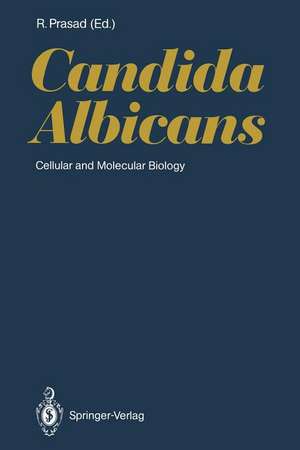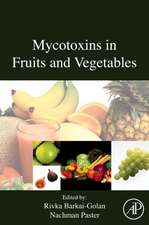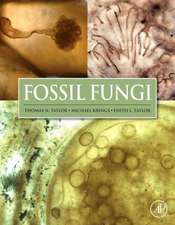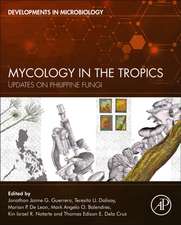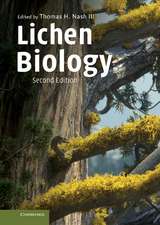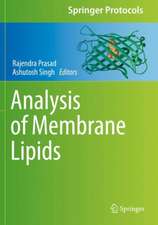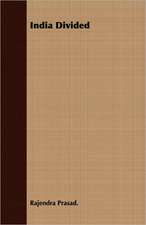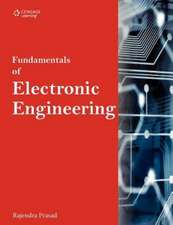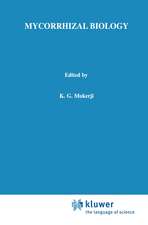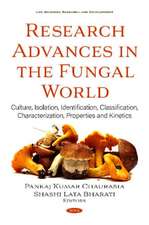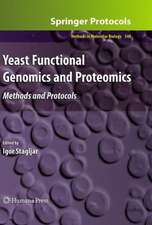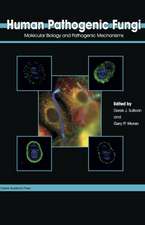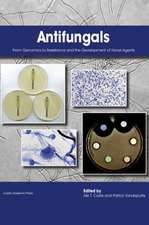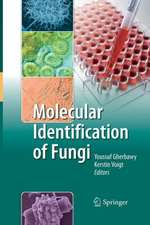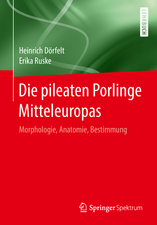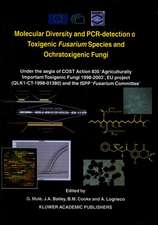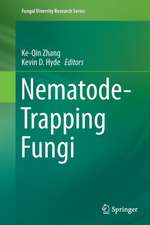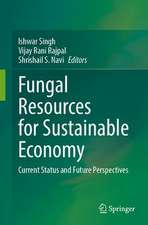Candida Albicans: Cellular and Molecular Biology
Editat de Rajendra Prasaden Limba Engleză Paperback – 7 dec 2011
| Toate formatele și edițiile | Preț | Express |
|---|---|---|
| Paperback (2) | 581.64 lei 38-45 zile | |
| Springer – 7 dec 2011 | 581.64 lei 38-45 zile | |
| Springer International Publishing – 4 mai 2018 | 1229.58 lei 6-8 săpt. | |
| Hardback (1) | 1235.88 lei 6-8 săpt. | |
| Springer International Publishing – 10 feb 2017 | 1235.88 lei 6-8 săpt. |
Preț: 581.64 lei
Preț vechi: 765.31 lei
-24% Nou
Puncte Express: 872
Preț estimativ în valută:
111.32€ • 115.91$ • 94.07£
111.32€ • 115.91$ • 94.07£
Carte tipărită la comandă
Livrare economică 03-10 martie
Preluare comenzi: 021 569.72.76
Specificații
ISBN-13: 9783642752551
ISBN-10: 3642752551
Pagini: 280
Dimensiuni: 155 x 235 x 15 mm
Greutate: 0.4 kg
Ediția:Softcover reprint of the original 1st ed. 1991
Editura: Springer
Colecția Springer
Locul publicării:Berlin, Heidelberg, Germany
ISBN-10: 3642752551
Pagini: 280
Dimensiuni: 155 x 235 x 15 mm
Greutate: 0.4 kg
Ediția:Softcover reprint of the original 1st ed. 1991
Editura: Springer
Colecția Springer
Locul publicării:Berlin, Heidelberg, Germany
Public țintă
ResearchDescriere
Candida, which was discovered more than a century ago as a causative organism of oral thrush, is now thought to potentially infect almost every tissue of the human body. Although we still do not have a safe anti-candida drug, the growing pace of progess of research on Candida albicans holds promise that a breakthrough is imminent. Though many monographs and articles on candida and candidoses have appeared in recent years, they mostly cover the clinical aspects. This particular text, however, explains the more basic features of candida including the molecular genetics, molecular biology and immunology of the cell wall, the molecular basis of morphogenesis and the structure and function of the plasma membrane. The role of anti-candida drugs and their mechanism of action are also discussed.
Cuprins
Morphogenesis in Candida albicans.- The Developmental Biology of the White-Opaque Transition in Candida albicans.- Growth and Respiration Characteristics of Candida albicans.- The Stress Response in Candida albicans.- Relationships Between Dimorphism, Cell Wall Structure, and Surface Activities in Candida albicans.- Immunological Moieties of the Cell Wall.- The Plasma Membrane of Candida albicans: Its Relevance to Transport Phenomenon.- Lipids of Candida albicans.- Adherence of Candida albicans: Influencing Factors and Mechanism(s).- Parasexual Genetics of Candida albicans.- Natural Heterozygosity and the Epidemiology of Candida albicans.- Progress in Candida albicans Molecular Biology.- Mechanism of Action of an Anti-Candida Drug: Amphotericin B and Its Derivatives.- Ergosterol Biosynthesis Inhibitors.
Notă biografică
Prof. Rajendra Prasad has recently joined Amity University, Gurgaon as Director of the Amity Institute of Biotechnology and Amity Integrative Sciences and Health. He is a former Professor & Dean of the School of Life Sciences at Jawaharlal Nehru University (JNU), New Delhi, where he served for 40 years in various capacities which included Chairman of Molecular Medicine and Rector (Pro-Vice-Chancellor). Holding a Ph.D. from the Central Drug Research Institute, Lucknow, Prof. Prasad has also served as a visiting professor at several universities and institutes, including the Ecole Normale Superieure – CNRS Paris, France; Catholic University, Louvain-la – Neuve, Belgium; Technical University, Valencia, Spain; Bristol Mayer Squib, Princeton, USA; University of Darmstadt, Germany; and New York Medical College, USA.
Prof. Prasad is a recipient of the Royal Society Commonwealth Bursary, Alexander von Humboldt-Stiftung Fellowship, Welcome Foundation Grant, and the Mercator Professorship at the University of Bonn. He is an elected fellow of all Indian Science Academies, a European Commission Focal Point Coordinator, and a Research Ambassador, Germany. He is also currently Vice President of the Indian National Science Academy, New Delhi.
Prof. Prasad has published over 225 research papers and has handled 50 national and international grants. He is a leading molecular mycologist and has conducted trendsetting research in the area of antifungal clinical drug resistance.
Prof. Prasad is a recipient of the Royal Society Commonwealth Bursary, Alexander von Humboldt-Stiftung Fellowship, Welcome Foundation Grant, and the Mercator Professorship at the University of Bonn. He is an elected fellow of all Indian Science Academies, a European Commission Focal Point Coordinator, and a Research Ambassador, Germany. He is also currently Vice President of the Indian National Science Academy, New Delhi.
Prof. Prasad has published over 225 research papers and has handled 50 national and international grants. He is a leading molecular mycologist and has conducted trendsetting research in the area of antifungal clinical drug resistance.
Textul de pe ultima copertă
This book on Candida albicans and similar pathogens provides a timely overview of the groundbreaking discoveries made in the areas of drug resistance, host–pathogen interactions, virulence, host immune system modulation, etc., in the last two decades.
This comprehensive 2nd Edition includes chapters on fungal infections, hyphal morphogenesis, molecular mechanisms of antifungal resistance, antifungal agents, multidrug transporters, virulence mechanisms in Candida albicans, host–pathogen interactions, the cell wall, fungal biofilms, lipids and antifungal resistance, signaling mechanisms and last but not the least host-immune responses. As such, it offers an ideal reference guide for mycologists, researchers, pharmacists, clinicians, and undergraduate students engaged or interested in fungal research. It will also benefit clinicians, who are required to keep abreast of the current state of research on antifungal drug resistance and antifungal development.
This comprehensive 2nd Edition includes chapters on fungal infections, hyphal morphogenesis, molecular mechanisms of antifungal resistance, antifungal agents, multidrug transporters, virulence mechanisms in Candida albicans, host–pathogen interactions, the cell wall, fungal biofilms, lipids and antifungal resistance, signaling mechanisms and last but not the least host-immune responses. As such, it offers an ideal reference guide for mycologists, researchers, pharmacists, clinicians, and undergraduate students engaged or interested in fungal research. It will also benefit clinicians, who are required to keep abreast of the current state of research on antifungal drug resistance and antifungal development.
Caracteristici
Gives an overview of the cellular and molecular biology of Candida albicans and similar pathogens Addresses both basic microbiology research and clinical aspects Offers an updated and comprehensive reference guide Includes supplementary material: sn.pub/extras
